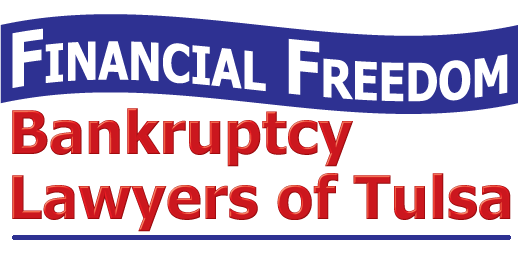Oklahoma Bankruptcy HelpWhat are the Basic Tulsa, Oklahoma Bankruptcy Rules?
 If you are overwhelmed with personal debts such as credit card bills and late car payments, you are probably curious about basic Tulsa, Oklahoma bankruptcy rules. It is important to first understand that there are two primary types of personal bankruptcy in Oklahoma: Chapter 7 and Chapter 13.
If you are overwhelmed with personal debts such as credit card bills and late car payments, you are probably curious about basic Tulsa, Oklahoma bankruptcy rules. It is important to first understand that there are two primary types of personal bankruptcy in Oklahoma: Chapter 7 and Chapter 13.
Chapter 7 Oklahoma Bankruptcy Rules
Chapter 7 Oklahoma bankruptcy rules allow the most complete forgiveness of debt, but require that you earn no more than a certain income level. As of November 2019, the levels are as follows:
- One-person household: $48,322
- Household of two people: $58,436
- Household of three people: $65,400
- Household of four people: $75,326
Source: U.S. Trustee Program/Dept. of Justice
For example, if you are a single mother with one dependent child and earn $60,000 a year, you do not qualify for Chapter 7 bankruptcy; you must file for partial Chapter 13 bankruptcy or forego bankruptcy entirely.
Credit Counseling is Required
Oklahoma bankruptcy rules require that you complete credit counseling with a federally approved agency before filing a petition. Also, Chapter 7 debtors are required to complete a second session before a judge will discharge their debts.
Ineligible Debts
You cannot discharge or reduce the following debts under Oklahoma bankruptcy rules.
Taxes: Only state, federal, and local tax debts that are at least three years old may be reduced or eliminated in bankruptcy. The three-year window begins with the date the tax return was filed, not the year of the tax return. In other words, if you filed your 2015 tax return in 2017, you cannot ask for a reduction or discharge of any resulting tax obligations until 2020.
Child Support or Alimony: The family court that handled your divorce or child support matter is the only venue through which you can apply for a modification in your familial support obligations.
Student Loans: Only private student loans can be included in bankruptcy in all circumstances. Government-issued loans such as Stafford can only be eliminated if your college has since closed, did not properly determine your ability to benefit from classes, or you have a serious and permanent disability. Keep in mind that receiving disability payments does not mean you will be declared disabled for the purposes of not paying your government-issued student loans.
Fraudulent Debts: Any debts accrued when you knew you would file for bankruptcy or debts incurred through lying on a credit application cannot be discharged in Chapter 7 or Chapter 13.
Time Frames
The fact that you filed Chapter 7 bankruptcy will be reflected on your credit report for 10 years from the date you or an attorney filed the case; the time frame is seven years for Chapter 13 cases.
If you choose to partially repay your obligations in Chapter 13, that repayment plan takes three to five years. During this time, you cannot legally get new credit without your bankruptcy trustee’s consent.
You can get new credit within a few months of receiving a Chapter 7 discharge, but it is usually difficult and higher interest rates are charged. Generally, it’s a good idea to wait a few years if possible.
Free Consultation: Tulsa Bankruptcy Attorney
Bankruptcy law and its forms are complicated, and mistakes will cost you. It is important to get the forms right the first time.
Your Tulsa bankruptcy attorney can help you understand the process and what debts you will likely be required to pay, which debts are secured with collateral, and what property is exempt.
Because we have worked with so many clients, we know how to do the filings right and how to make the process efficient. Our goal is to make affordable debt relief in Tulsa available to anyone who needs to get out from under debt and back on top of their financial life.
Get out from under by calling for the help you need today. We are here to help.
To receive your free initial bankruptcy analysis, call Freedom Financial Bankruptcy Lawyers of Tulsa today at 918-786-9600.




